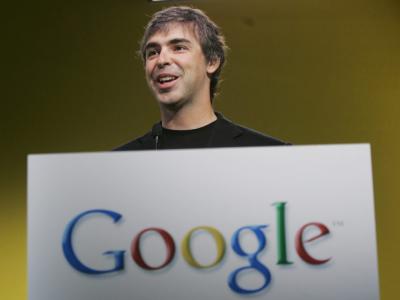Few businessmen are pushing the boundaries of technology further than that of Google co-founder and CEO Larry Page. Where Steve Jobs was able to streamline and successfully market, Page innovates.
After meeting fellow co-founder Sergey Brin whilst earning his doctorate degree (at Stanford!) in 1996, Page helped create an algorithm that would launch the most successful search engine on the web and turn it into an empire of innovation, trailblazing technology in almost every field. But having recently faced lawsuits from Apple, Microsoft and Oracle, and with Facebook beginning to take aim at the search engine market, Page now faces fierce competition from those eyeing his success with envy.
Google’s record of successes and technological advancements is too long to list, from prying the smartphone market from the hands of Apple with android, now the most successful smartphone platform on the market, to the highly anticipated Project Glass, which is a product that allows HUD to be shown to a user via a pair of augmented reality glasses. The overlay allows the user to recognize other users and display personal information, give directions via Google maps, voice-to-text translations, directional audio detection and numerous other features. While some skeptics believe that the demo for Project Glass is overly ambitious and outside of the realm of current technology, leaving the current product far different than what is shown in Google’s demo.
As his father, Carl Page, was one of the early pioneers of computer technology in the beginning of the 1960’s, this obsession with the future that has led to advancements like Project Glass is the fruition of a lifelong love affair with technology. After founding Google with Brin, they handed the title of CEO to Eric Schmidt in 2001, who ran the company while Page and Brin took a backstage role in development.
Since returning to the CEO role in 2011, Page has overseen his vision of a maintaining a company with a commitment to its consumers and the evolution of knowledge rather than its shareholders.
“We take our responsibility to be a steward of public information and to give people the right
information, we take that very seriously.” Page said recently in an interview with Charlie Rose.
“We’re a little bit able to do that because of our independence in governance and so on.”
This philosophy makes Page somewhat of an anomaly among big technology corporations. Where Microsoft and Apple have famously attempted to maintain brand loyalty within their consumer base by limiting compatibility between their products and those of competing companies, Google has taken a more open approach, in keeping with Page’s mantra of “Don’t Be Evil.” A sentiment that, according to Page, isn’t shared with their biggest online competitor, Facebook, leading Page to condemn the social media giant as it begins to encroach on Google’s biggest money maker: search engines.
“I think it’s been unfortunate that Facebook has been pretty closed with their data … and I think we would certainly — you know, we’re in the business of searching data. We don’t generally turn it down when it’s offered to us,” Page told Rose.
Hot on the heels of court victories against Oracle and Microsoft, both of which sued Google for copyright infringement, Page maintains that the principle of fair use is a critical doctrine for making information technology accessible and affordable to all.
“In general, I think we’d like to see content on the Internet being made more open and so on.” Page said. “Technology is only 1% of where it could be.”



GIPHY App Key not set. Please check settings